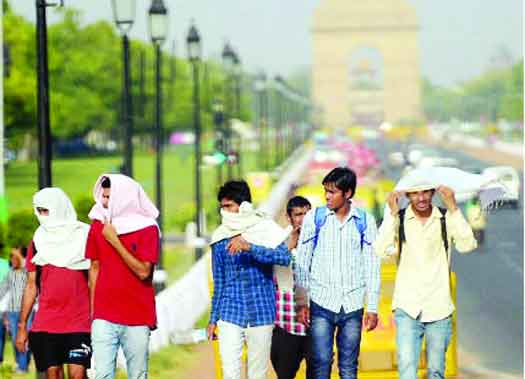It appears that the summers are getting hotter. It is time we looked at climate change making the summers worse
Headlines are screaming about how temperatures across the country are hitting record highs. On social media, users are posting pictures of their car thermometers in cities like Delhi often displaying readings of temperatures rising above 50oC. As many as 10 places in India currently figure among the 15 hottest in the world. Further, according to the Ministry of statistics and programme implementation, heat waves and cold waves in the country have increased greatly over the past two years. While the number of heatwaves increased 14 times in 2017 compared to 2016, the number of cold waves spiked 34 times in the same period. The fact of the matter is that summers in India have become progressively warmer over the years. While the heat that builds up over north and central India creates a large low pressure zone, which draws in the rain-laden clouds from the Indian Ocean, the temperatures are now hitting deadly levels, making living and working outside downright dangerous for the people. Not everyone has the privilege of working indoors, sitting comfortably inside the office premises. From delivery boys to traffic policemen and women as also service staffers, who work in this unbearable heat — all risk their lives just as they are doing their daily routine jobs. They do not have a choice and we doff our caps to these brave souls working in these truly atrocious conditions. One irony of soaring temperatures is that it makes those, who can afford to use air conditioners, use them more. There is nothing wrong per se. In this heat, any creature comfort that can make one feel cooler is a must. But air conditioners work by exchanging heat and the exhaust from them, in homes, offices and cars make the outside air hotter still. And then there is the power needed to power all the cooling devices, made from polluting coal as India still generates a bulk of its electricity from thermal sources. To make matters worse this summer, when the thin air is usually blowing around, air pollution levels normally reduce dramatically but this year, Delhi’s Air Quality Index has been stuck in the severe category for days. One reason for that is likely the more intense measuring of pollution nowadays, but residents in cities across North India feel the air they breathe and they will tell you that it is dirtier than usual.
The example of air conditioners and how their use has built up a positive feedback cycle making the heat worse is a prime example of climate change-driven by our everyday actions. And we can feel that the average temperature is rising year after year when we step out into the heat and feel our skin sear and notice the roads melt. This is just another challenge for the new Government, how to balance the needs of the population with the environment. You can’t stop people from using air conditioners if they can afford it and more Indians can afford it every year. But you can mandate more efficient air conditioners alongside better building design and strive for cleaner energy sources. One of the keys to protect oneself from the heat waves is to avoid exposure to direct sunlight during the hottest time of the day, around noon time. Alongside, State Governments must play a proactive role in implementing the NDMA guidelines, which lays down the measures to prepare, protect, and mitigate the ill-effects of heat waves. With advanced meteorological forecasting systems, the public can be alerted as soon as the temperatures cross the threshold limit. They must be advised about the precautionary measures to be taken, especially the most vulnerable lot. It is only a matter of time when the headlines will scream out that the temperature in Delhi, which is after all a city of 20 million souls, will exceed 50oC at a measuring station. By then, it might be too late to turn back time even as the effects of climate change causes an increase in extreme weather-related events.
Writer & Courtesy: The Pioneer








 OpinionExpress.In
OpinionExpress.In















Comments (0)